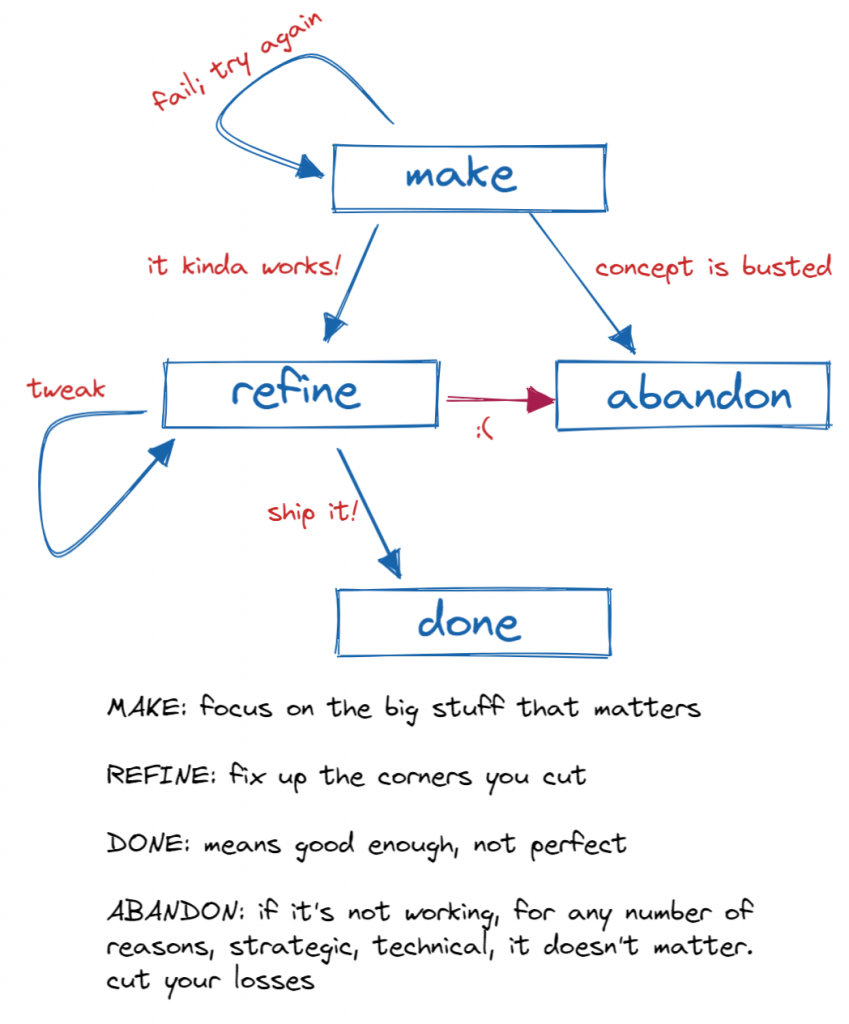For many founders the whole process of building a product and bringing it to market is stressful and anxiety-inducing. Founders want confirmation that they’re on the right track. But is this a reasonable thing to want? And does it matter?
Startups are an unusual environment where you’ll succeed if you focus on the things that truly matter at the expense of everything else. Not many things in life are like that. In college, for instance, you can “cheat” by picking easy courses or by studying for the test instead of for comprehension. College is artificial and all the metrics can easily be gamed.
It’s not just college that’s artificial. Consider these occupations that never leave the make-believe world:
- Tax advisors game metrics for a living. Government makes the tax laws and the tax industry figures out ways to skirt them. It’s an endless game of cat-and-mouse that provides no particular value to society. It’s basically a boring competitive video game where you get points according to some byzantine rule system and also the points are money.
- Many, but not all, charities fall into this artificial category. They raise funds for causes that deserve our attention, but then what happens? Being good at fundraising and being good at making the world better are two entirely different skillsets. It shouldn’t surprise anybody that when charities optimize for their ability to tug on our heartstrings they get good at that, and only that. Charities don’t need to be good at improving outcomes in order to be considered successful, they just need to look like charities and play the part.
- An employee in IT that works hard to keep everything running smoothly might get no credit because all the value provided is invisible. Another employee that works weekends to put out fires of his own creation gets lauded for his work ethic. You’d think that businesses, because they want to make money, actually get really good at making something people want to pay for. But you’d be wrong because a businesses isn’t a person and it doesn’t have a singular will. It’s an organization first and foremost, made up from individuals who have personal goals often at odds with the goals of the business. An established business can survive on momentum for decades, churning out low quality products with poor customer service.
Disconnects like these are the default everywhere, not the exception. I’m not making a point here about misaligned incentives. The point is that these artificial environments provide simple benchmarks for success for the people in them. At work and at school your boss/teacher will tell you what to do and whether you’re doing a good job. You might still be working on pointless projects (see Graeber’s bullshit jobs), but it doesn’t really matter, because you don’t get judged on efficacy.
From this perspective it makes total sense that people feel scared and anxious when they start a startup. They need to transition from an artificial environment to one where they have to sink or swim. The complete freedom and apparent randomness of startup life feels scary and unstructured. Nobody tells you what to do or if you’re doing a good job, and the outside feedback you get feels totally random.
Some weeks you’ll get many thank you messages. Other weeks people say mean things about you or your startup on twitter. You’ll never know what triggered the positive and negative reactions, but you can easily lose your mind trying to figure it out. We assume these fluctuations are just noise, unless we see clear contrary evidence. You want to focus on the things that matter at the expense of everything else, which means you can’t let outside forces hijack your day.
If you work every day to make your app better and if you work every day to get the word out there, what do you have to be anxious about? Traffic goes up, traffic goes down. Customers come, customers go. Competitors come and competitors go. Much of this is completely beyond your control. The process is what matters and the process is extremely simple:

Work on the product in chunks until you believe it’s good. First make the most basic solution that works. Then refine it until it’s good enough to ship. Start with the hard parts and work your way back to the easy stuff (registration, login, documentation, etc.). Work on marketing with an “all of the above strategy”. Finetuning is for later, after you have established your startup is viable.
What is under your control is the work you do, and there is nothing random about it. Luck still plays a major factor of course. You can’t know in advance how many people want the thing you’re making. Sometimes you swing and you miss. And if we keep swinging we’ll hit a homerun sooner or later. But hopefully sooner :).
PS: It’s day 40. We’re half way through! And we have 20% of an app! Oh boy.

